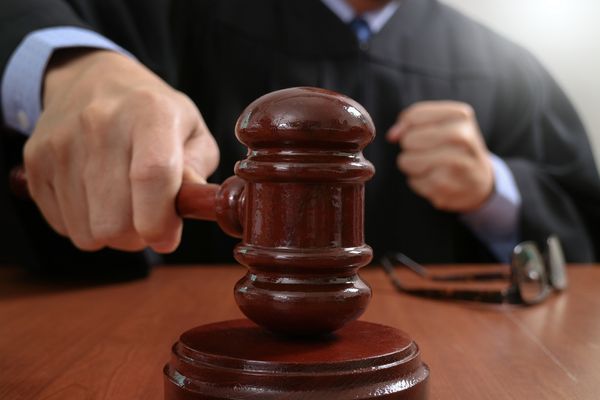1.3.1
The Church
Role of the Church in Medieval England
Role of the Church in Medieval England
The church played a crucial role in law enforcement in Medieval England.


Role of the Church
Role of the Church
- The Saxons were incredibly religious and if a local jury was unable to decide if someone was innocent or guilty then they would allow God to decide, using Trial by Ordeal.
- All trials, except Cold Water, took place inside the church in the presence of a priest.
- This practice was ended in 1215 by Pope Innocent III.


Trial by hot iron
Trial by hot iron
- This was usually a trial taken by women.
- The accused carried a red-hot piece of metal for three paces.
- The hands of the accused were bandaged for three days and then unwrapped.
- If the wound was healing nicely they were innocent, if not they were guilty.


Trial by hot water
Trial by hot water
- This trial was usually taken by men.
- The accused had to dunk their hand into boiling hot water to retrieve an object.
- Once again the hand and arm were bandaged for three days
- If the burns were healing the accused was deemed innocent, if the wounds were festering then they were considered guilty.


Trial by blessed bread
Trial by blessed bread
- This trial was usually taken by Priests that were accused of a crime.
- A priest that was present prayed that the accused would choke on the bread if they had lied.
- The accused then ate the bread and was deemed guilty if they choked.


Trial by cold water
Trial by cold water
- This trial was usually taken by men.
- The accused would be put into a pool of water or river. Often the accused was lowered into a river with a rope tied around their waist.
- If the accused sank below God’s pure water then he was innocent - having been accepted by the water.
- If the accused floated then they’d been rejected by the pure water and was found guilty.
Other Methods Used by the Medieval Church
Other Methods Used by the Medieval Church
In addition to Trial by Ordeal, the church used additional methods which could be seen to hinder the justice system in Medieval England.


Sanctuary
Sanctuary
- If you had committed a crime, were on the run and you could reach a church, you would have been able to claim sanctuary.
- This means that the church would protect you.
- No one would be able to remove you from the church, not even the County Sheriff.


Sanctuary continued...
Sanctuary continued...
- The criminal would have 40 days during which to decide whether to face trial in the church court, or leave the country.
- If they opted to leave the country they would have to travel to the nearest port barefoot, carrying a wooden cross and get onboard the first ship heading abroad.


Church courts
Church courts
- The church claimed they had the right to try any clergyman accused of a crime in its own courts.
- The trial would be in the presence of a local bishop.
- The main difference with the church court was that they would never sentence anyone to death regardless of how serious the crime was.
- This meant someone could get away with murder.
- Moral offences such as failure to attend church, adultery and drunkenness were usually dealt with by the church courts.


Benefit of the Clergy
Benefit of the Clergy
- This was when the accused claimed the right to be tried in the church courts, usually because they were more lenient.
- In theory, this right should only have been for priests and men of the church.
- But, in reality, if you were connected to the church in any way you could claim this right.
- The church would often test people claiming benefit of the clergy by making them read a verse from the bible.
- This verse became known as the ‘neck verse’ as it saved your neck, or enabled you to escape hanging.
1Medieval England, 1000-1500
1.1Changing Definition of Crime in Medieval England
1.2Nature of Law Enforcement & Punishment
1.3Case Studies From 1000-1500
2Early Modern England, 1500-1700
2.1Changing Definitions of Crime
2.2Nature of Law Enforcement & Punishment
318th & 19th Century Britain
3.1Changing Definition of Crime in Industrial Britain
3.2Nature of Law Enforcement & Punishment
4Modern Britain, 1900-Present
4.1Changing Definition of Crime in Modern Britain
4.2Nature of Law Enforcement & Punishment
5Whitechapel Local Study
5.1The Geographical Area & Living Conditions
5.2The People of Whitechapel
5.3Policing in Whitechapel
5.3.1The Police Force in Whitechapel
5.3.2Jack the Ripper
5.3.3Challenges Facing the Police
5.3.4End of Topic Test - Policing in Whitechapel
5.3.5Grade 9 - Policing Whitechapel
5.3.6Diagnostic Misconceptions - Professional Police
5.3.7Diagnostic Misconceptions - Jack the Ripper
5.3.8Diagnostic Misconceptions - Vigilance Committee
5.3.9Diagnostic Misconceptions - Rundown Whitechapel
Jump to other topics
1Medieval England, 1000-1500
1.1Changing Definition of Crime in Medieval England
1.2Nature of Law Enforcement & Punishment
1.3Case Studies From 1000-1500
2Early Modern England, 1500-1700
2.1Changing Definitions of Crime
2.2Nature of Law Enforcement & Punishment
318th & 19th Century Britain
3.1Changing Definition of Crime in Industrial Britain
3.2Nature of Law Enforcement & Punishment
4Modern Britain, 1900-Present
4.1Changing Definition of Crime in Modern Britain
4.2Nature of Law Enforcement & Punishment
5Whitechapel Local Study
5.1The Geographical Area & Living Conditions
5.2The People of Whitechapel
5.3Policing in Whitechapel
5.3.1The Police Force in Whitechapel
5.3.2Jack the Ripper
5.3.3Challenges Facing the Police
5.3.4End of Topic Test - Policing in Whitechapel
5.3.5Grade 9 - Policing Whitechapel
5.3.6Diagnostic Misconceptions - Professional Police
5.3.7Diagnostic Misconceptions - Jack the Ripper
5.3.8Diagnostic Misconceptions - Vigilance Committee
5.3.9Diagnostic Misconceptions - Rundown Whitechapel
Unlock your full potential with Seneca Premium
Unlimited access to 10,000+ open-ended exam questions
Mini-mock exams based on your study history
Unlock 800+ premium courses & e-books